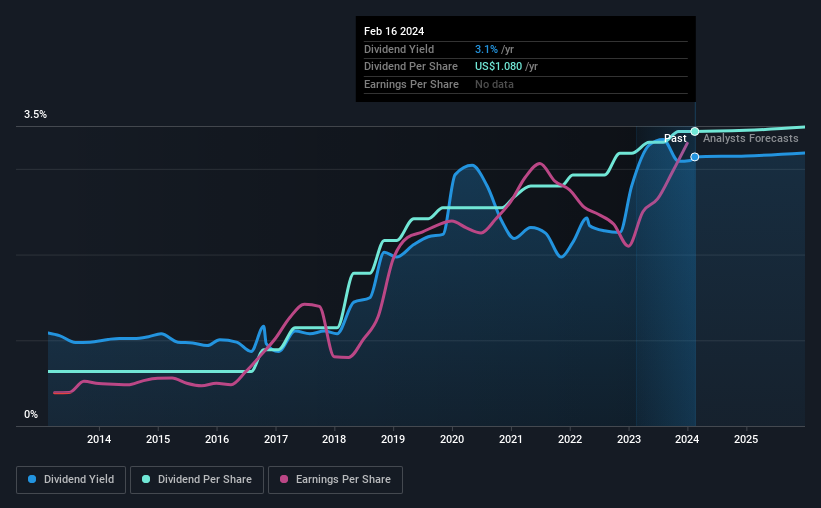National Bank Holdings (NYSE:NBHC) Could Be A Buy For Its Upcoming Dividend
National Bank Holdings Corporation (NYSE:NBHC) is about to trade ex-dividend in the next four days. Typically, the ex-dividend date is one business day before the record date which is the date on which a company determines the shareholders eligible to receive a dividend. The ex-dividend date is of consequence because whenever a stock is bought or sold, the trade takes at least two business day to settle. Therefore, if you purchase National Bank Holdings' shares on or after the 22nd of February, you won't be eligible to receive the dividend, when it is paid on the 15th of March.
The company's next dividend payment will be US$0.27 per share, on the back of last year when the company paid a total of US$1.08 to shareholders. Calculating the last year's worth of payments shows that National Bank Holdings has a trailing yield of 3.1% on the current share price of US$34.40. Dividends are a major contributor to investment returns for long term holders, but only if the dividend continues to be paid. So we need to investigate whether National Bank Holdings can afford its dividend, and if the dividend could grow.
Check out our latest analysis for National Bank Holdings
If a company pays out more in dividends than it earned, then the dividend might become unsustainable - hardly an ideal situation. That's why it's good to see National Bank Holdings paying out a modest 28% of its earnings.
When a company paid out less in dividends than it earned in profit, this generally suggests its dividend is affordable. The lower the % of its profit that it pays out, the greater the margin of safety for the dividend if the business enters a downturn.
Click here to see the company's payout ratio, plus analyst estimates of its future dividends.
Have Earnings And Dividends Been Growing?
Stocks in companies that generate sustainable earnings growth often make the best dividend prospects, as it is easier to lift the dividend when earnings are rising. If earnings fall far enough, the company could be forced to cut its dividend. For this reason, we're glad to see National Bank Holdings's earnings per share have risen 13% per annum over the last five years.
The main way most investors will assess a company's dividend prospects is by checking the historical rate of dividend growth. In the past 10 years, National Bank Holdings has increased its dividend at approximately 18% a year on average. Both per-share earnings and dividends have both been growing rapidly in recent times, which is great to see.
To Sum It Up
Should investors buy National Bank Holdings for the upcoming dividend? Companies like National Bank Holdings that are growing rapidly and paying out a low fraction of earnings, are usually reinvesting heavily in their business. Perhaps even more importantly - this can sometimes signal management is focused on the long term future of the business. National Bank Holdings ticks a lot of boxes for us from a dividend perspective, and we think these characteristics should mark the company as deserving of further attention.
While it's tempting to invest in National Bank Holdings for the dividends alone, you should always be mindful of the risks involved. Case in point: We've spotted 1 warning sign for National Bank Holdings you should be aware of.
A common investing mistake is buying the first interesting stock you see. Here you can find a full list of high-yield dividend stocks.
Have feedback on this article? Concerned about the content? Get in touch with us directly. Alternatively, email editorial-team (at) simplywallst.com.
This article by Simply Wall St is general in nature. We provide commentary based on historical data and analyst forecasts only using an unbiased methodology and our articles are not intended to be financial advice. It does not constitute a recommendation to buy or sell any stock, and does not take account of your objectives, or your financial situation. We aim to bring you long-term focused analysis driven by fundamental data. Note that our analysis may not factor in the latest price-sensitive company announcements or qualitative material. Simply Wall St has no position in any stocks mentioned.

